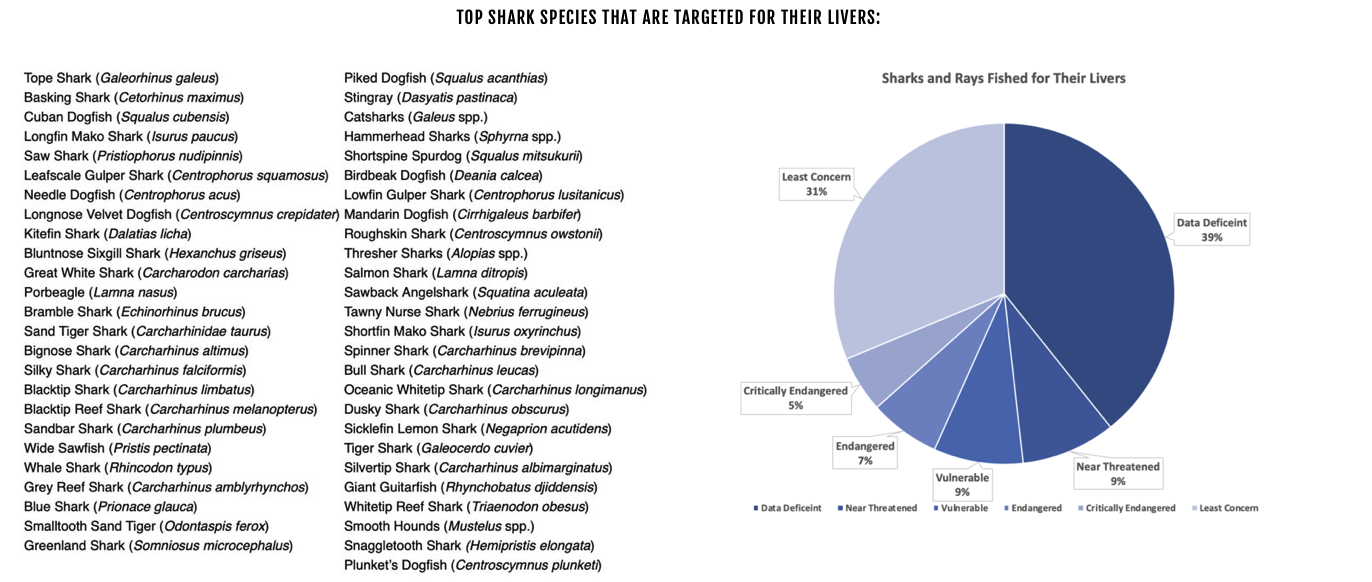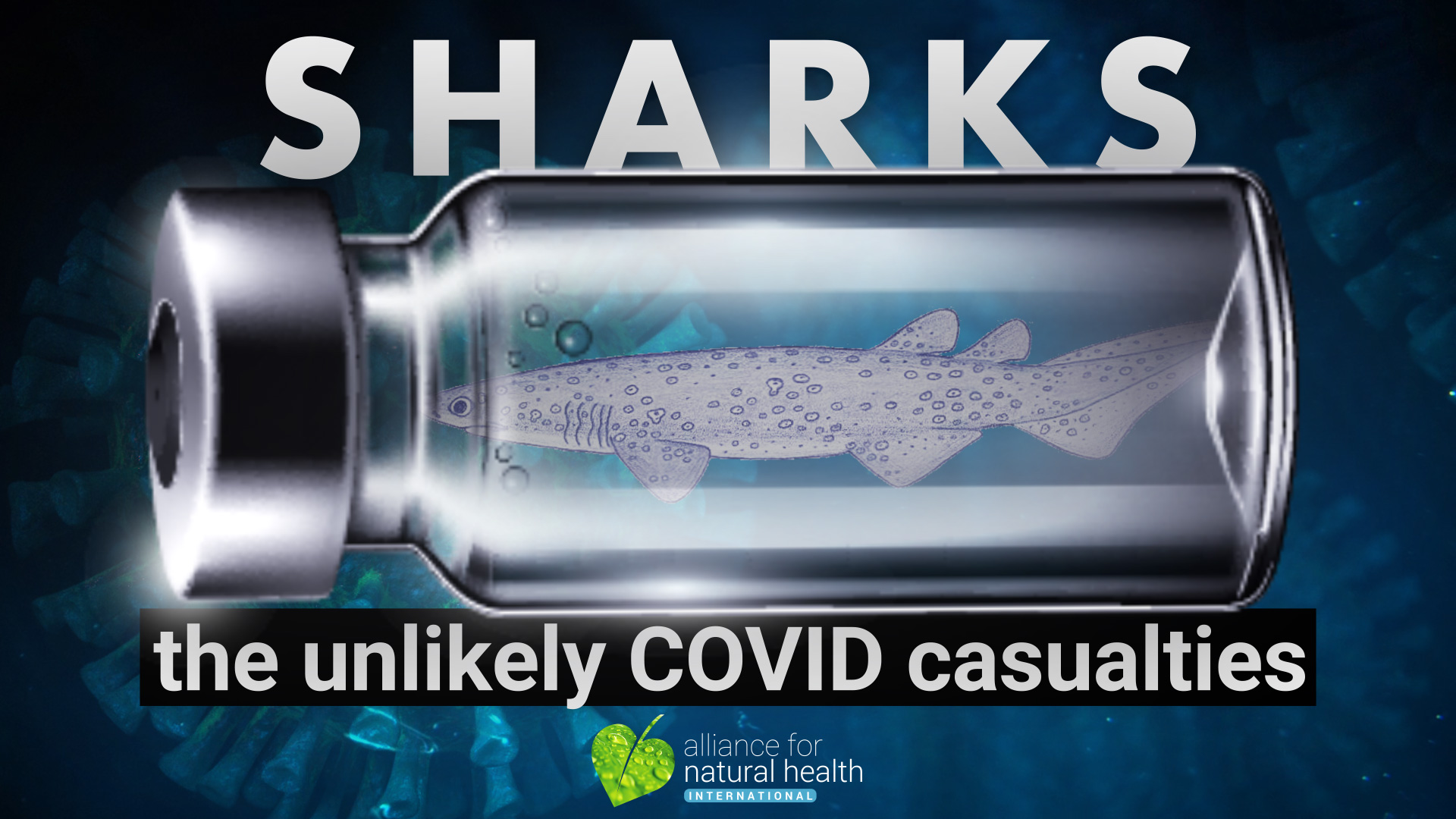Content Sections
Do you recall being asked if you’re prepared to accept the slaughter of half a million sharks to obtain an ingredient needed in some of the candidate Covid-19 vaccines? We don’t!
Leading California-based shark conservation organisation Shark Allies has estimated that 250,000 sharks would need to be killed to deliver the squalene needed to vaccinate the global population, as planned. That doubles to a shocking half a million if two doses of the vaccine are required.
Note: You will see an advertising banner beneath our videos that play off the Brighteon platform (when they are not maximised). This advertising helps support the Brighteon platform that doesn't charge subscribers for their content, is committed to free speech, yet is also respectful of copyright-related law. We'd like to clarify that no advertising revenue from Brighteon is received by the Alliance for Natural Health Intl.
Shark attack
Currently, around 100,000 to 200,000 sharks are estimated to be harvested to supply the growing demand for shark fins and shark liver oil, the latter being the main source of squalene used in cosmetics, supplements, medicines and vaccines. Around 3,000 sharks, most fished from the deep oceans, are needed for every ton of squalene.
At least 5 candidate Covid-19 vaccines rely on squalene, which is emulsified with surfactants and used as an adjuvant to enhance the immune response. Shark-derived squalene has been by far the most common form of high-purity squalene used in drugs and vaccines, while plant-based squalene is now the dominant source used in cosmetics – the sector that uses over 60% of the global production.
Shark over-fishing
Such is the interest in the many functions and uses for squalene that the international market is set to double from its present level (approx. US$100 million) to over US$200 million by 2024.
Sharks belong to a group including skates, rays and chimaeras referred to as the chondrichthyan fishes. There are around 500 described species of shark, all of which have relatively slow growth rates, low reproductive potential and late sexual maturity, making them particularly vulnerable to over-fishing. Global populations are now in decline.
Deep-water sharks – that are the primary sources of shark liver oil, are the most vulnerable to fishing with population growth rates 40% to over 60% lower than other types of shark (pelagic and coastal species). Owing to the presence of deep-water sharks between 100 metres and sometimes up to 4000 metres below the ocean surface, their numbers and detailed ecology are often not well understood. Collapse of populations of top predators like sharks can result in uncontrolled ‘trophic cascades’ with devastating ecological consequences to marine ecosystems and biodiversity.

A deep-water gulper shark, Centrophorus granulosus. Listed as ‘critically endangered’ on the International Union for Conservation of Nature (IUCN) Red List of Threatened Species. [Source: Sharkwater.com]
Beyond Jaws: humans are the cause of shark decline
The direct-action marine conservation movement Sea Shepherd has exposed the horrors of the unregulated world of deep-water shark fishing for shark oil. There is still extensive use of illegal gill nets, rather than long lines. Sea Shepherd helped the Liberian Coast Guard arrest the crew of an internationally-blacklisted fishing vessel off the Liberian coast in 2017.
Over 50 shark species are targeted for their livers. Around half of these are endangered, while 5% of these are critically endangered, including the deep-water gulper shark, Centrophorus granulosus.

Source: Shark Allies
Another half a million threatened
Sharks are not the only species to suffer at the hands of humans. The milking of around half a million horseshoe crabs every year, many of which subsequently die, is ongoing as a source of limulus amebocyte lysate (LAL) that’s used to detect endotoxins in drugs and vaccines. The National Geographic reported that LAL from horsehoe crabs will need to be used in any Covid vaccines used in the USA.
Plant and microorganism derived squalene
Despite the continued ravaging of shark populations to harvest shark liver oil for squalene, there are many alternatives that involve sourcing squalene from plants, microorganisms or biosynthetically using genetic engineering.
Some examples are as follows:
- Plant-based squalene from olive oil
- Plant-based squalene from fermentation of sugar cane (Amyris)
- Plant-based squalene from breadfruit tree (Artocarpus) leaves
- Cyanobacteria source of squalene
- Microbial production of squalene
- Genetic engineering of yeasts
What next?
To prevent further decimation of shark populations for shark liver oil and squalene, four things must happen as a matter of urgency.
- Vaccine, food and cosmetic manufacturers must be forced to declare their use of shark-derived squalene which is not a sustainable source
- Manufacturers need to transition as a matter of urgency to plant, microbe or synthetic sources of squalene to avoid further damage to endangered shark populations
- The public must avoid using any product containing shark-derived squalene or shark liver oil, whether a vaccine, food supplement or cosmetic
- Food labelling laws must be changed to force manufacturers to be transparent about whether squalene in products is animal, plant, microorganism or synthetically sourced.
Take action NOW!
- Sign the Shark Allies petition asking COVID-19 vaccine frontrunners to replace shark squalene with existing sustainable alternatives
- Post about Shark Allies’ #SharkFreeVaccines and #SharkFreeProducts campaign on your social media channels
- Don’t purchase and consume cosmetics or food supplements that contain shark liver oil or shark-derived squalene (often just labelled as ‘squalene’)
- Learn and make your friends and family aware of the damage caused to shark populations and marine ecosystems by harvesting shark fins and shark liver oil
- Share this article with your social networks so they can learn more about the way Covid vaccines might threaten deep-water sharks, some of which are critically endangered
- Help create awareness with merchants, restaurants, online distributors and manufacturers that sell shark products, and ask them to discontinue the product.
- See more at Shark Allies.
Find out more about ANH campaigns:
- Covid - Adapt Don’t Fight campaign
- Health system sustainability campaign
- Food4Health campaign








Comments
your voice counts
08 October 2020 at 8:15 pm
I am healthy, and healthy people have a normal immune reaction to infectious pathogens such as viruses and germs. We do not need any adjuvants in a Vaccine in order for us to have an immune reaction to the particles of viruses and germs that are present.
Note: So, why are healthy people being forced/tricked into taking Adjuvants they don't need?
Note: The Quote below Is Take Directly From Article Referenced Below:
The research presented in this article exposes a wide gap between evidence and public policy with regard to influenza vaccination in context of the 2009 pandemic and yearly seasonal epidemics. This is both hard to accept and difficult to ignore. It is hard to accept because it shows that the WHO and health authorities worldwide failed to protect the interests of the most vulnerable during the 2009 flu pandemic, fostering instead the interests of a few big corporations. It is also hard to accept because it calls into question seasonal flu vaccination campaigns, a well-established practice recommended for decades by the WHO and by most public health authorities worldwide.
At the same time, the data presented are difficult to ignore because the lack of a scientific basis for seasonal flu vaccination campaigns has been repeatedly attested since 2006 by epidemiologists from top-tier institutions, including Tom Jefferson from the Cochrane Collaboration, Lisa Jackson from the Group Health Center for Health Studies in Seattle, and Lone Simonsen from the School of Public Health at George Washington University, to name a few. Why have their recommendations not been heard? Why do health authorities at local, national, and international levels ignore their solid, evidence-based expert advice? Margaret McCartney, elected in 2013 to the Royal College of General Practitioners (United Kingdom), in a brief and pointed contribution to the British Medical Journal at the start of the present influenza season, raised the question of what use is mass flu vaccination and concluded that, in view of the available evidence, the current policy is impossible to justify.67
The case of flu vaccination exemplifies what researcher Alan Cassels has named the dilemma between “eminence-based medicine” and “evidence-based medicine.” Cassels defines “eminence-based medicine” as “relying on the opinion of a medical specialist or other prominent health official when it comes to health matters, rather than relying on a careful assessment of relevant research evidence.” Narrowing the gap between scientific evidence and public health policies with regard to influenza is a serious and urgent matter, one that implies confronting the interests of big pharmaceutical corporations and their allies at academic and governmental levels. It won't be easy, but the credibility of science and the well-being of many are at stake.
Author's Note
The content of this article was delivered at a conference at the Johns Hopkins Bloomberg School of Public Health on March 18, 2014.
Reference:
Flu Vaccination: The Gap Between Evidence and Public Policyjournals.sagepub.com › doi › abs
Jun 15, 2015 — Keywords flu vaccination, public policy, pharmaceutical companies, vaccination ... Demicheli, V, Di Pietrantonj, C, Jefferson, T. Vaccine for preventing influenza in healthy adults ... March 13, 2014. http://onlinelibrary.wiley.com/doi/10.1002/14651858.CD001269.pub5/abstract. ... CD004879.pub4/abstract.
Your voice counts
We welcome your comments and are very interested in your point of view, but we ask that you keep them relevant to the article, that they be civil and without commercial links. All comments are moderated prior to being published. We reserve the right to edit or not publish comments that we consider abusive or offensive.
There is extra content here from a third party provider. You will be unable to see this content unless you agree to allow Content Cookies. Cookie Preferences